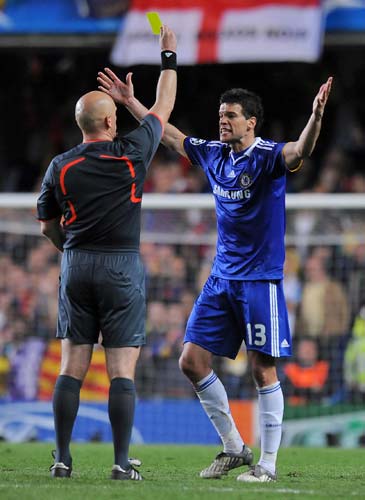The Last Word: Time has come to halt play and stop mistakes
Football resists the march of technology to preserve its continuity but a referral system could be fitted in

Much has changed in football over the last 20 years: all-seated stadiums, huge playing squads, the back-pass rule, the Champions' League, the ever-growing use of substitutes and penalty shoot-outs, Sky TV, even squad numbers on shirts. So why is the control of matches still entrusted to one person with a whistle, two assistants with flags and a fourth official with a scoreboard showing the amount of extra time to be played?
If ever a case was made for the use of TV technology and more match officials, it was last week's Champions' League semi-finals, after which two players will be unjustly banned from playing in the biggest matches of their club careers – unless Manchester United are successful in their appeal against Darren Fletcher's dismissal – and a referee was abused and subjected to death threats.
It is all too easy to blame the red cards for Fletcher and Barcelona's Eric Abidal and the failure to award Chelsea at least two penalties on incompetent refereeing. While Tom Henning Ovrebo's performance at Stamford Bridge was poor, that is the price you pay for putting so much responsibility in the hands of one individual. Referees, like anyone, can have bad days, and the pace of the modern game is such that it is asking much of them always to be in position to make the best judgement.
One of the reasons the dismissals of Fletcher and Abidal received such publicity was that there were so many cameras that the action could be viewed from all angles. In both cases the referees, through no fault of their own, were making verdicts based on rear views. Would they have made the same mistakes with the benefit of another pair of eyes looking head on? A second referee and four linesmen could make a major difference.
Yet even with more officials, errors would still be made, which is why football needs to embrace TV technology. Almost every other major sport using a moving ball does, including cricket, rugby, tennis and American football.
Opponents of video replays rightly point out that football is not like many other sports in that play can be continuous for many minutes. With no natural break, will everyone have to stop for a video ruling? When Ovrebo decided not to award a penalty after Michael Ballack's shot had been charged down, what if Barcelona had broken away and were about to score when play was halted?
These legitimate concerns would need to be addressed. Managers could be given the right to challenge decisions (or non-decisions, such as failure to award penalties) but could be restricted in the number of times they could do so. In tennis, players are allowed to make three unsuccessful challenges to line calls in each set.
How about offering managers the right to make two challenges in each half? The challenges would have to be made within, say, five seconds of an incident and would be made not to the referee but to the fourth official, who could then decide when to halt play. In the theoretical Ballack incident, it would be after the conclusion of Barcelona's breakaway.
Would the authority of referees be undermined? In tennis, players believe umpires are now more reluctant to overrule line calls because video technology might make fools of them. In cricket the referral system inevitably highlights umpiring errors. Yet in both cases video replays have, for the most part, shown how brilliantly officials do their job with the naked eye.
The status of referees might be diminished, but was it right that there was so much focus on Ovrebo last week rather than on a compelling match? What is more important, preserving the power of referees or eliminating injustices?
A video replay system would cost money but football is awash with cash. It might only be deployed in the biggest competitions, such as the Champions' League or competitive internationals. For reasons of cost, tennis uses Hawk-Eye only on show courts.
One of the benefits in tennis is that there are fewer on-court histrionics. Even John McEnroe would surely have refrained from screaming "You cannot be serious!" at a computer, while Ballack and Didier Drogba might not have behaved so appallingly if their complaints had been put to a screen test.
As a side benefit, the introduction of TV technology might help English football shed its reputation for bad losers. In 2005 the Swedish referee Anders Frisk retired in the wake of intimidation after another Chelsea defeat by Barcelona, while in 2004 the Swiss Urs Meier, having denied England a goal which might have given them victory over Portugal, was given police protection following a campaign of vilification in which he was sent 16,000 emails after his address was published in a newspaper.
There were base suggestions that Ovrebo was not up to the task because he is Norwegian and part of a Uefa conspiracy to stop two English teams reaching the final, even though sending off a Barcelona player when they were trailing midway through the second half would have been a curious way of achieving such a result.
Chelsea can expect sanctions when Uefa meet to consider their case this week, but football's governing bodies would also do the wider game a service by announcing a major review of the way in which matches are refereed.
Join our commenting forum
Join thought-provoking conversations, follow other Independent readers and see their replies
Comments
Bookmark popover
Removed from bookmarks